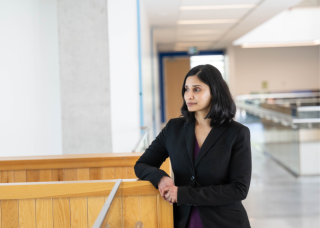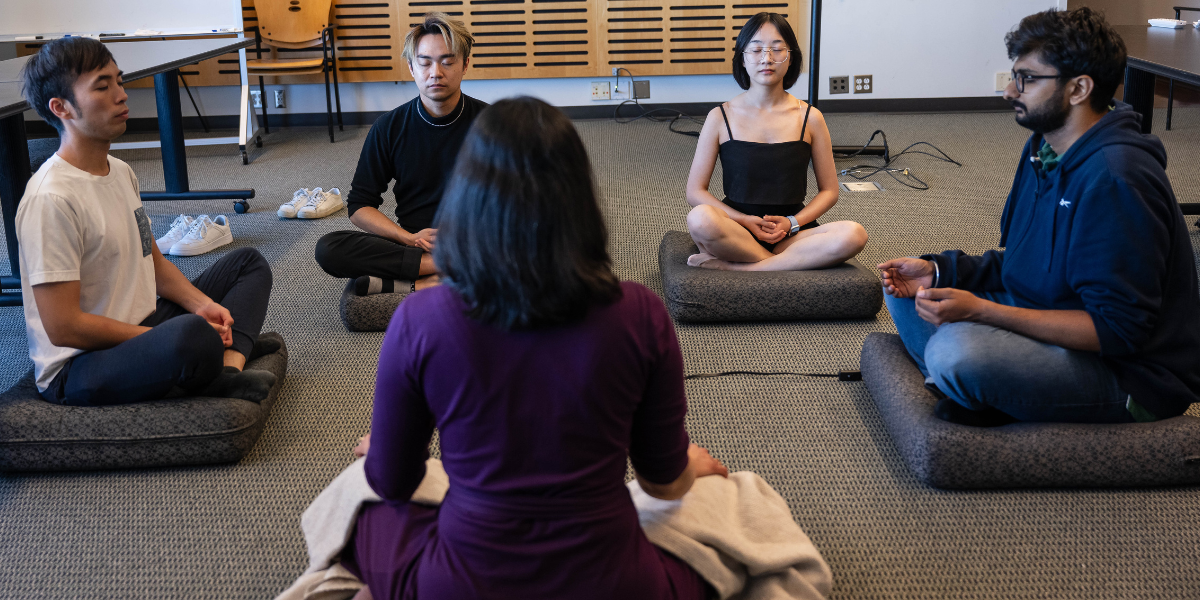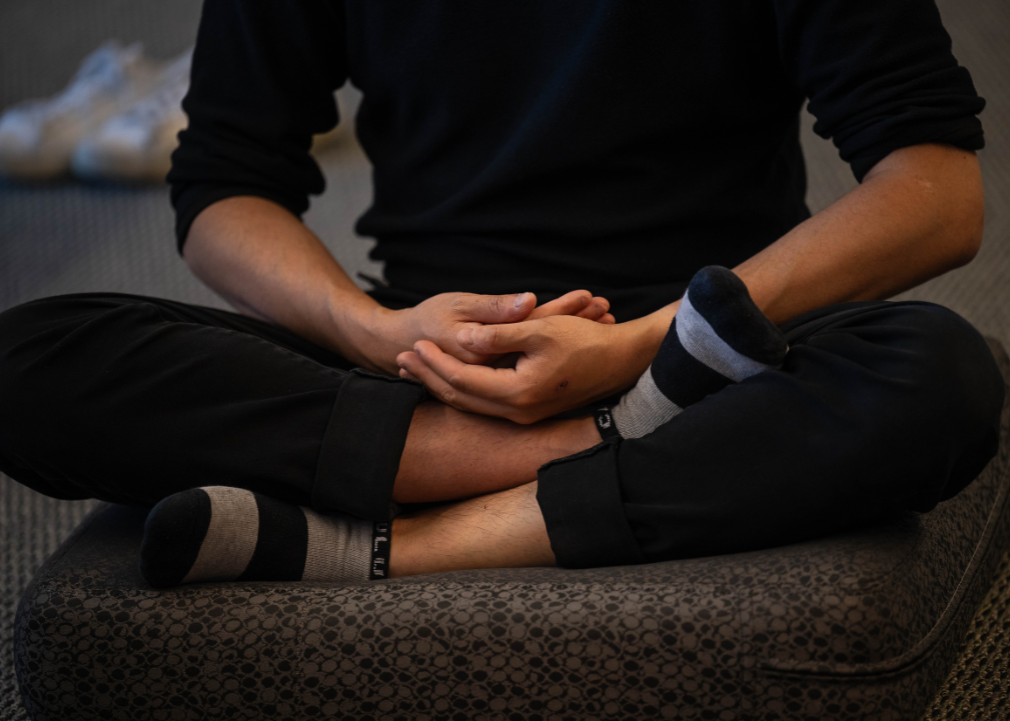Blending science and meditation to help students learn with a calm mind
Varada Kolhatkar is seamlessly integrating meditation into the academic routine to foster tenacity and emotional regulation

Varada Kolhatkar is seamlessly integrating meditation into the academic routine to foster tenacity and emotional regulation

In spring of 2024, we asked our faculty and staff to tell us who among them were leading the way in generating positive change at the university. This is the final story in a five-part series recognizing their efforts.
Close your eyes, sit in a comfortable upright position, and observe your breath. It sounds simple, but meditation can feel daunting and uncomfortable – both physically and emotionally – as it involves observing intense sensations without judgment. As a result, it’s not always the first choice for improving our mental wellbeing.
Dr. Varada Kolhatkar, an Assistant Professor of Teaching from the Department of Computer Science, aims to change that. She is committed to bringing self-awareness and meditation into the lives of her busy Master of Data Science students. Acknowledging their rigorous workload, Varada wanted to offer some practical tools they could incorporate into their daily routine to help them unwind and positively influence the community’s mental health.
The UBC Master of Data Science is an accelerated 10-month program where students complete 24 courses in just eight months, including biweekly closed-book exams, followed by a two-month Capstone project with industry partners. Staying current in the rapidly evolving field of data science, a busy workload and uncertainties in the job market can contribute to student anxiety.


Varada aims to equip students with tools to manage stress and anxiety, so that they can tune into their body and become more mindful. Having personally benefited from meditation, she believes incorporating it into a daily routine is an effective way to cope with difficult emotions. She explains “Mindfulness helps us step back from distractions and environmental demands, allowing us to be present in the moment. Of course, mindfulness doesn’t have to involve sitting and observing the breath—it can be anything that helps you unwind, like going for a run or riding a bike. The main point is to create space for letting go.”
“Learning Vipassana meditation has been the most meaningful experience of my life. It provided me with practical, concrete tools to manage difficult emotions,” Varada comments.
It is a daunting experience for any faculty member to walk into a lecture theatre of 100 students – many with their heads down looking at phones, tablets and laptops – and to try to grasp their undivided attention. During her September 2023 orientation session, Varada gathered the confidence to lead her students in a 10-minute meditation, in a bid to bolster their mental resilience ahead of the forthcoming hectic 10-month period.
A number of students reached out afterward to express their appreciation for the session. Encouraged by the positive feedback, Varada decided to take it a step further by organizing a 30-minute lunchtime meditation every Wednesday. Students who regularly attend have embraced this time to simply be—without distractions, devices, or conversation—just observing their breath and being present. The feedback has been overwhelmingly positive.
“The meditation session helped me to become aware during a moment of stress,” said one student. “These sessions have been invaluable in helping me to regulate my emotions and deal with the demands of the Master of Data Science program,” said another.
Reflecting on the benefits of meditation, Varada says: “I care deeply about the wellbeing of my students and colleagues. Having experienced the pressures they face, I want to share the practical tools I gained from an intense 10-day meditation course to help manage stress in a healthy, constructive way. Change doesn’t happen overnight—it takes regular practice to see real benefits, which is why making mindfulness a habit and seamlessly integrating it into daily routines is so important.”
“These sessions have been invaluable in helping me to regulate my emotions and deal with the demands of the Master of Data Science program.”
A UBC Master of Data Science student
As a scientist, Varada is immersed in a logistical, data-driven world. She points out that there is a growing body of scientific evidence supporting the benefits of meditation on the brain, particularly in areas involved in emotion, pain, and cognitive control.
“Occasionally, when people hear the word ‘meditation,’ they associate it with religion or a sect. Some hesitate to try it, thinking it’s not scientific,” says Varada. “In our short sessions, the meditation focuses on a universal object—the breath. It gives participants a chance to step back from distractions and focus on their breath and bodily sensations.
“There is substantial evidence showing that this type of meditation helps reduce stress and address common challenges of modern times, such as constant distractions and the ongoing demands of the environment, ultimately leading to deeper contentment and tenacity.”
Varada notes that “meditation is not a magical cure.” She explains that meditation itself does not directly eliminate stress or anxiety. “Instead, it trains your mind to observe and accept reality as it is, without judgment. One outcome of this practice is an increased awareness of your mental patterns, which helps you recognize the onset of anxiety or stress. By becoming aware of these emotions and simply observing them without resistance or reaction, you naturally diminish their intensity,” Varada explains.
For the past six months, Varada has been tucked away in a quiet room with a few students each Wednesday for her meditation sessions but she would love to build the confidence to lead a regular meditation with her full student cohort.
She states: “People are so busy and so distracted with devices in the classroom. Meditation would allow them to start their learning process with a calm mind.”
Her next step will be to make the sessions open for the wider Computer Science department and to encourage other faculty members to implement the relatively simple meditation practice in their departments or classrooms.
Varada concludes: “I would like to take concrete steps to cultivate a culture of mindfulness and wellbeing across the university, promoting a commitment to mental health that nurtures both personal development and intellectual growth.”
Written by Meadhbh Monahan, UBC Internal Communications
Interviewed in July 2024
Prescription for inclusive healthcare (Sept. 16)
Building a culture where learning and community can thrive (Sept. 23)
When stars align to create immersive experiences for student learning (Oct. 1)
Mobilizing research, action, and communities to address climate change (Oct. 7)
Find the latest news, updates, events, and useful dates from across UBC, curated for faculty and staff by Internal Communications.
Access a library of resources from multiple UBC websites, all in one place.